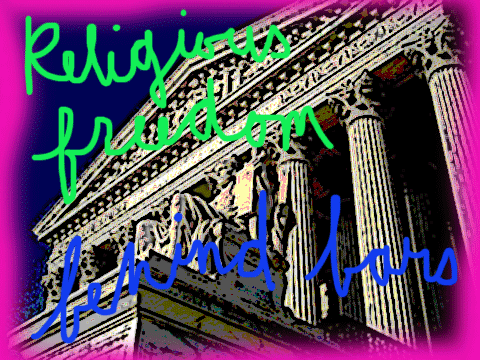
This is a case from last week that I didn’t want to overlook.
Civil rights advocates are concerned that prison inmates may have lost their one effective remedy when confronted with violations of their religious freedom with Tuesday’s Supreme Court ruling.
The First Amendment Center explains:
The Court ruled in Sossamon v. Texas that states may not be sued for money damages under the Religious Land Use and Institutionalized Persons Act, a 2000 federal law aimed in part at protecting the First Amendment right of prisoners to practice their religion.
The ruling still allows inmates to win injunctions that would stop or change policies that impinge on religious freedom. But critics say that without the possibility of monetary damages, states will have little incentive to change their ways or punish officials for their actions. Critics argue that without damages it will be easy for states to avoid the scrutiny of courts by transferring or releasing prisoners or by slightly modifying policies to make cases moot.
“The ability to freely practice the religion of one’s choice is a fundamental constitutional right and not one that is taken away just because you are incarcerated,” said Steve Shapiro, legal director of the American Civil Liberties Union. “Today’s decision will too often leave state prisoners without any remedy for serious violations of their religious rights. And prison policies that violate religious rights will in many cases escape judicial review entirely.”
J. Brent Walker, executive director of the Baptist Joint Committee for Religious Liberty, also criticized the decisions. “We are disappointed in the majority’s pinched view of what was a clear congressional intent to provide prisoners broad protection for religious liberty and a robust remedy for its violation, including monetary damages.”
Read the rest for the details of this interesting case, and for the court’s reasoning, both that of the majority and of those who dissented. (It was a 6-2 ruling with Kagan reccusing herself since she’d had some involvement when she was Solicitor General.)
